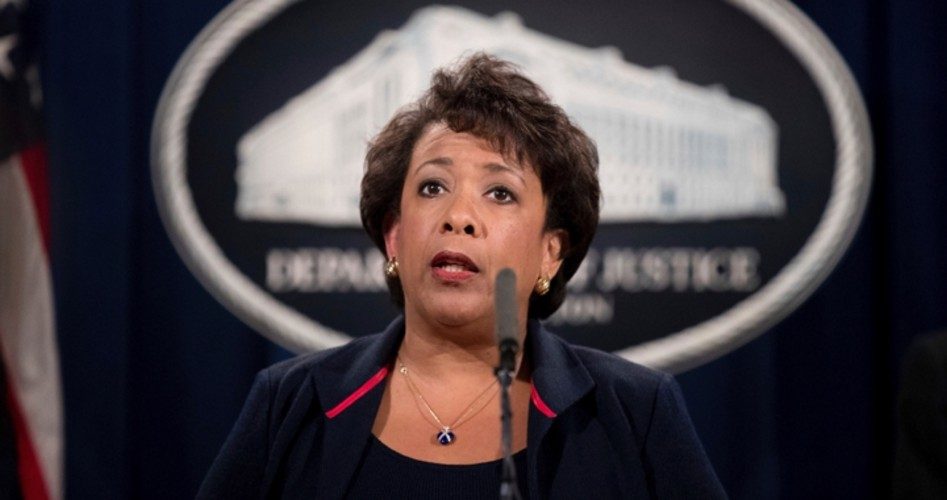
It can perhaps be dangerous turning over rocks in the government swamp when you’re a swamp creature. The Democrats may learn this the hard way, with President Trump now accusing ex-Attorney General Loretta Lynch (shown) of providing cover for Hillary Clinton during the FBI investigation of her illegal use of a private e-mail server.
Trump’s accusation was made in an early Tuesday morning tweet in which he wrote, “A.G. Lynch made law enforcement decisions for political purposes…gave Hillary Clinton a free pass and protection. Totally illegal!”
The president was, of course, referring to ousted FBI Director James Comey’s testimony in front of the Senate Intelligence Committee last week, during which he confessed he felt “queasy” after Lynch told him not to call the Clinton probe an “investigation” but, rather, to term it a “matter.”
As the New York Post reported Tuesday, “Comey, whom Trump fired last month, said Lynch’s choice of wording was an attempt to match it up with how the Clinton campaign was explaining the investigation.”
The paper continued, “‘I don’t know whether it was intentional or not,’ he said. ‘But it gave the impression that the attorney general was trying to align how we describe our work with the way it was being described in a political campaign.’… Lynch also came under fire for meeting with former President Bill Clinton at an airport in Arizona in June while she was investigating his wife.”
That June meeting was criticized by both Republicans and Democrats and smacked of an in-your-face move, as Lynch met with Bill Clinton privately — for a full half hour.
This Lynch-Clinton connection was addressed in last week’s Comey testimony when Senator John Cornyn (R-Texas) asked the ex-FBI director, “It seems to me that you clearly believe that Loretta Lynch, the attorney general, had a — an appearance of a conflict of interest on the Clinton e-mail investigation. Is that correct?”
To this Comey responded, “I think that’s fair. I didn’t believe she could credibly decline that investigation — at least, not without grievous damage to the Department of Justice and to the FBI.”
What certainly has been damaged is Comey’s reputation. Not only had he lost the confidence of Republicans and Democrats, but his behavior as FBI director was further questioned by Attorney General Jeff Sessions Tuesday during his testimony before the Senate Intelligence Committee.
As the Washington Post reported, “Attorney General Jeff Sessions defended his decision to recommend that FBI Director James B. Comey be fired, calling Comey’s decision to supersede then-Attorney General Loretta E. Lynch’s authority ‘stunning.’”
“‘It violates fundamental powers,’ Sessions said of Comey’s decision to announce the termination of the FBI’s probe into Hillary Clinton’s use of a private e-mail server instead of deferring to Lynch,” the Post continued.
As for powers, Sessions was asked Tuesday by Senator Cornyn if Comey was right to assert that the “president can fire an FBI director for any reason, or for no reason at all,” as the Post put it. “‘Yes, and I think that was probably good for him to say,’ Sessions said, remarking that he believed the next FBI director — the administration has named Christopher Wray as Trump’s pick for the job — would be ‘new and excellent’ in the post,” the paper continued.
Of course, this is just stating the obvious. As head of the government’s executive branch, the president has authority over all those working within that branch. He’s the “boss.”
Comey had acknowledged this also with respect to investigations, saying during his testimony, “I think as a legal matter, president is the head of the executive branch and could direct, in theory, we have important norms against this, but direct that anybody be investigated or anybody not be investigated.”
Actually, this theory is fact. While the FBI may have a tradition of “relative” independence, it is not a fourth branch of government; rather, it’s an extra-constitutional entity created more than 100 years after our nation’s founding. As law professor Alan Dershowitz, who has long been driving this point home, wrote last Thursday, “The president is the head of the unified executive branch of government, and the Justice Department and the FBI work under him and he may order them to do what he wishes.”
Moreover, as I pointed out last Friday, “Those protesting this, saying, ‘But then the president is above the law!’ haven’t thought matters through. Sure, a president could order an FBI director to cease an investigation into his own misdeeds. But this is irrelevant because the FBI is not the vehicle through which a malfeasant president is held accountable.”
“That vehicle, as constitutionally dictated, is impeachment — via Congress.”
In light of all this, there is a matter that, from my vantage point, hasn’t been properly addressed. It’s something Comey should have been pressed on during his testimony.
Comey confessed under oath that he leaked a memo, outlining the contents of a meeting with the president, because he wanted to encourage the appointment of a special prosecutor. Yet he admitted that Trump had not personally been under investigation for any reason. In addition, again, he has acknowledged that the president has the power to halt any investigation and to fire the FBI director for any reason.
So the question arises: Why then did he desire a special prosecutor’s appointment?
Was it merely the spiteful action of a disgruntled ex-employee? As Dershowitz has rhetorically asked, “Where’s the crime?”
Whether the crime was on the part of Comey, Lynch or someone else remains to be seen. What seems certain is something quite lamentable: Russian intrusion (assuming it was Russia) into our election systems has achieved its desired goal of creating domestic political unrest.
With espionage common, hacking by Russia and others is nothing new. And it’s now said that Russian hackers targeted voter databases and software systems in 39 states — twice as many as previously reported. But this operation didn’t alter the vote.
Rather, the Obama administration itself believed that the goal was to “undermine confidence in the election,” as Bloomberg reported Tuesday. If that was the goal, it was successful beyond perhaps even the hackers’ wildest dreams.
So maybe Vladimir Putin (or whoever was behind the hacking efforts) is sitting in a room somewhere right now, gleefully rubbing his hands together while giving thanks for Democrats, demagogues and the left-wing Western press.
Photo of Loretta Lynch: AP Images



